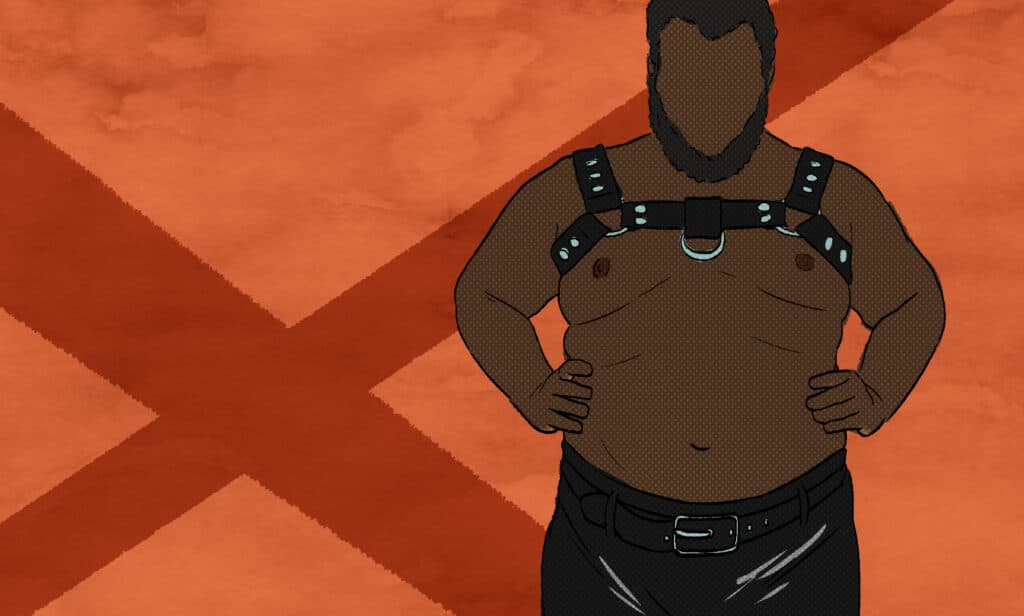Kinky gay sex is facing an existential threat – and it’s a fight we all must join

(PinkNews)
Connecting with our queer, kinky history has never been more important.
The Backstreet – London’s last remaining gay leather bar – has announced it will be permanently closing its doors in July.It’s part of a worrying trend of queer fetish spaces shutting down, or being targeted by local governments with outdated, draconian laws.
The closure epidemic of London’s gay venues is nothing new of course – it’s been a point of discussion for over a decade, with many speculating whether the rise of hookup apps, greedy property developers or increasing acceptance of LGBTQ+ people in straight venues is to blame.
The Backstreet closing its doors hits a little different though. This isn’t just a gay bar – vital as they are. This is a dedicated gay fetish space where queer men meet with the sole intention of cruising and f**king. It’s an unsanitized and unapologetically pro-sex iteration of queerness that can’t be pinkwashed or appropriated by brands looking to garner a few inclusivity points during Pride Month. The Backstreet isn’t going to get the superficial, saccharine “love is love” treatment or rainbow brand sponsorship anytime soon. Why? Gay sex still offends. Gay leather sex especially so.
As a community we can have a short memory
While The Backstreet has not yet clarified the reason for closure, I can’t help but feel the looming termination of this nearly 40-year-old cruising ground is symbolic of larger forces at play in the LGBTQ+ community. The most apparent being a huge disconnect with our own queer, kinky histories.

(PinkNews)
As a community we can have a short memory – we live in a world structured through cisheteropatriarchy which makes forging links and sharing knowledge with queers across generational lines complicated. Most of us don’t grow up with queer parents who pass on their stories, experiences and wisdom. In a way, each generation of queers starts anew, groping towards each other in the dark, slowly building networks of commonality, care and organising.
One of the fallouts of this disconnect with our own queer histories is ignorance of the historic scenes and spaces which formed significant sites of both homophobic oppression, and gay struggle. For example, how many of us are familiar with Operation Spanner?
Operation Spanner was a British police investigation into gay sadomasochistic sex in the late 1980s. It resulted in 16 men being prosecuted for having completely consensual, kinky gay sex, in private. From 1987 to 1990, several police forces – led by the Metropolitan Police – questioned around 100 gay and bisexual men, named 43 individuals in an official report, and jailed 16.
It’s no coincidence that this all occurred at a time when homophobia in the UK was reaching an alarming crescendo – despite gay sex being partially decriminalised some 20 years earlier.
The police investigation was launched a year after the British government’s fear-mongering ‘Don’t die of ignorance’ HIV/AIDs campaign – which added to the stigma queer men already faced. And in the very same month Operation Spanner began, Margaret Thatcher had given her now infamous warning of children being taught “that they have an inalienable right to be gay” at the 1987 Conservative Party Conference. Just a year later, Section 28 was in place.
With this context, it becomes clear that punishing kinky gay sex was an easy way to continue institutionalised, state-sponsored homophobia in the absence of overt buggery laws. The resulting public spectacle of the trial at the Old Bailey bolstered the widespread belief that gay sex was intrinsically perverted and deviant.
‘Puriteen’ trend is a threat to kinky gay sex
So let’s get back to The Backstreet. It opened in April 1985, just two years before the police and pearl-clutching homophobic public decried those into gay S&M sex – or what The Times later labelled a “vicious and perverted sex gang”. The leather bar survived and outlasted the anti-gay culture war of its time: a physical site of resistance to sexual conservatism and homophobia. As it closes its doors, and as I look at the growing strength of “puriteen” perspectives in the queer community, I worry about who will take on the baton of fighting for gay sex – in all its forms.
The term “puriteen” is shorthand for the current phenomenon of sex negativity among Gen Z, for whom porn, kink and casual hookups are increasingly viewed with suspicion, or even as downright harmful. What this puriteenism obscures are the battles fought by our queer elders and forerunners – leathermen, leatherdykes and sadomasochists – to have the kinds of consensual, gay sex they wanted without being jailed or pathologised.

(PinkNews)
As Operation Spanner shows, there are real dangers when we invoke morality and judgement on what consenting adults can or cannot do. It doesn’t take much for someone’s personal ‘ick’ to transform into state supported carceralism and censorship.
I also worry about the way these emerging sex negative attitudes easily assimilate into the ideologies of conservative and religious groups who want to legislate LGBTQ+ people out of existence. For example, on social media, much has been made of Netflix show Heartstopper being “good” queer representation, largely because it features no sex, drugs or swearing. While there’s nothing wrong with a cutesy queer story, the argument espoused by some young queers that the sexlessness of the show makes it better, is alarming: The gap between queer people applauding on-screen, virginal purity, and media giant Disney removing any “overtly gay affection” from its movies, is not a big one.
As a community, we’re constantly asked to disappear ourselves, blend in, not rub our sexuality in straight people’s faces. Now that same reactionary admonition is coming from within the community. It’s hard not to see this as a capitulation to homophobia.
Thankfully, there is hope for the future of queer sex and fetish. Over the last few years a smorgasbord of queer-centred BDSM, kink and fetish play parties and socials have emerged. A monthly leathermen’s social has been running at Comptons of Soho since 2013, and last year TNG Leatherdykes (a munch for the next generation of kinky lesbians) launched too. There’s the well known Klub Verboten and Crossbreed, arriving in 2016 and 2019 respectively; Temporary Cruising Zone, an all-gender queer play party based in Birmingham; Club Labrys, a BDSM fetish sex party for queer women; and Thorn London, a play party for LGBTQ+ people of colour that had its first event last year.
Contemporary queer fetish events are continuing the legacy of kinky gay sex that forms a crucial part of our queer history. I encourage readers of this to support and attend these spaces. And if that’s out of your comfort zone, why not take a trip to the Bishopsgate Institute’s UK Leather and Fetish Archive, and get to know your queer, kinky history?

